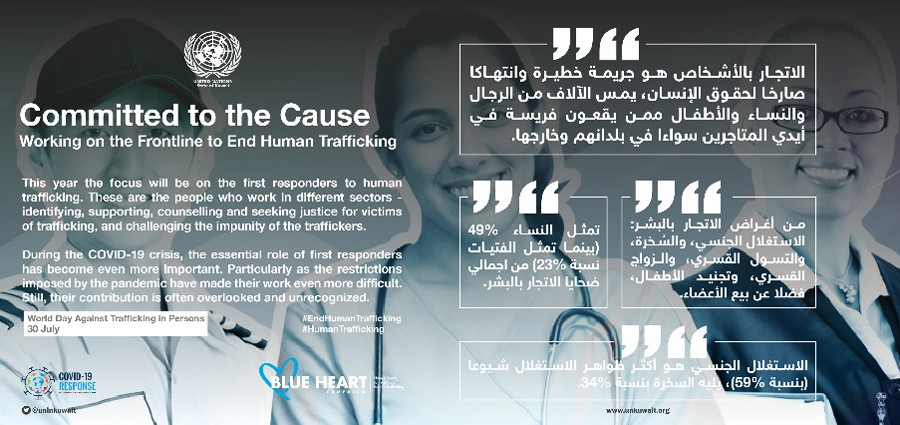On the World Day Against Trafficking in Persons, the United Nations and its mandated agencies, including the International Organization for Migration (IOM), and the United Nations Office on Drugs and Crimes (UNODC) affirms their commitment towards combatting the heinous crime of trafficking in persons.
The crime of trafficking in persons is amongst the 3 largest crimes in the world that generate profits for the traffickers, and no country in this world is immune to the unethical acts of human trafficking, whether it is a country of origin, transit or a destination.
The Trafficking in Persons Protocol Adopted by the UN General Assembly in 2000, is the first and only international instrument with an agreed definition on trafficking in persons. It supports a comprehensive approach, at international, regional and national levels, to prevent human trafficking, to punish the traffickers and to protect and assist the victims, with full respect for their human rights.
Despite almost every country having national human trafficking laws broadly in line with the UN Trafficking in Persons Protocol, globally, people continue to be trafficked. What is more, in many countries, victims may still be criminalized and the impunity of traffickers prevails.
In ratifying the Protocol, Member States have committed to the protection of victims, prosecution of perpetrators, and prevention of trafficking. In ensuring these commitments are translated into action, it is essential Governments “Act Now”, to take urgent, expedient and practical action with the best interests of victims of trafficking as the primary consideration.
The State of Kuwait had shown exemplary approach to tackling such issues. This is exactly what we have witnessed in that few months under the wise leadership of HH the Amir of Kuwait Sheikh Sabah Al-Ahmad Al-Jaber Al-Sabah, and the capable government ensuring high level values and ethics in fighting visa trading and ensuring compliance with international standards and commitment to UN conventions with accuracy and strict law enforcement”.
“During the COVID-19 crisis, the essential role of first responders (institution, organization, team or community) has become even more important. Particularly as the restrictions imposed by the pandemic have made their work even more difficult. Their contributions are extremely essential and timely to impact fighting trafficking”. Dr Tarek added.
Since the ratification of Law No. 91 of 2013 on Combating Trafficking in Persons and Smuggling of Migrants, the State of Kuwait has taken drastic measures towards the protection of trafficked victims, prevention of trafficking crimes and prosecution of perpetrators.
IOM has been working extensively in cooperation with various governmental entities, UN agencies, NGO’s, private sector and the diplomatic community to combat trafficking in persons. In previous years, IOM partnered with the Ministry of Foreign Affairs, Interior and Information in organizing 4 awareness raising campaigns that shed light on the pressing issue of human trafficking.
This is in addition to numerous workshops, trainings, study tours, and symposiums in cooperation with the Public Authority for Manpower, provided to employees of media and governmental sectors, and members of the diplomatic community and NGO’s to enhance their knowledge about human trafficking and the identification of potential victims.
And through UNODC’s Blue Heart Campaign, governments, but also the private sector and concerned citizens, can get involved in helping victims become survivors. Every day, in every country in the world, human traffickers exploit people for profit. The poor and the vulnerable are most at risk. Over 70 per cent of detected trafficking victims are women and girls, while nearly one third are children”.
Judge Hatem Aly added: “COVID-19 has amplified trafficking dangers. Loss of jobs, growing poverty, school closures and a rise in online interactions are increasing vulnerabilities and opening opportunities for organized crime groups. The crisis has overwhelmed social and public services, impacted the work of law enforcement and criminal justice systems, and made it harder for victims to seek help.
As has been the case so far, UNODC is committed to cooperation with various UN agencies, NGO’s, private sector and the diplomatic community to combat trafficking in persons, support relevant Government institutions to protect the victims and potential victims of trafficking in persons.
To mark World Day Against Trafficking in Persons on 30 July, the UN Voluntary Trust Fund for Victims of Human Trafficking, Especially Women and Children, managed by the United Nations Office on Drugs and Crime (UNODC), together with the Rukus Avenue Music Group, will air a live virtual concert at 12 PM EDT. https://www.unodc.org/endht/

